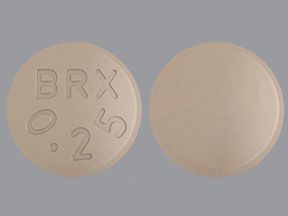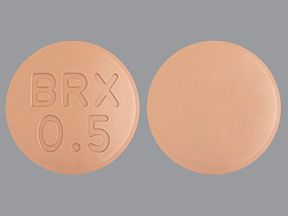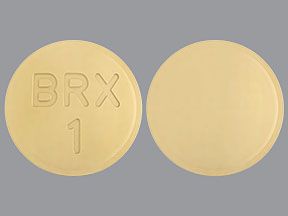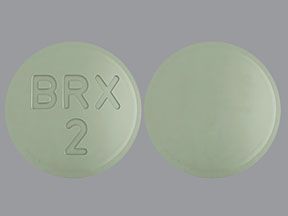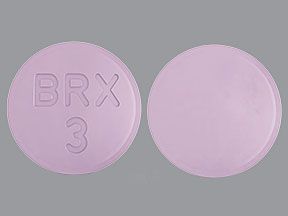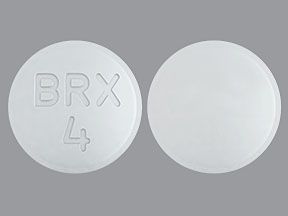Rexulti (brexpiprazole) is a brand-name drug that’s prescribed for certain mental health conditions. Rexulti comes as an oral tablet that’s typically taken once per day. The dosage can vary depending on what condition the drug is used to help treat.
The Food and Drug Administration (FDA) has approved Rexulti to treat:
- major depressive disorder, which is usually called depression, in adults*
- schizophrenia in adults and children ages 13 years and older
- agitation related to dementia from Alzheimer’s disease in adults
Rexulti belongs to a drug class called atypical antipsychotics. Rexulti is not available in a generic version.
* Rexulti is taken in combination with an antidepressant for this use.
Below is information about typical therapeutic Rexulti dosages. Therapeutic dosage refers to the dosage at which the medication has been shown to work.
Rexulti form
Rexulti comes as tablets that you swallow.
Rexulti strengths
Rexulti tablets are available in the following range of strengths:
- 0.25 milligrams (mg)
- 0.5 mg
- 1 mg
- 2 mg
- 3 mg
- 4 mg
Typical dosages
Typically, your doctor will start you on a low dosage. Then they will adjust it over time to reach the amount that’s right for you. Your doctor will ultimately prescribe the smallest dosage that provides the desired effect.
The following information describes dosages that are commonly used or recommended. However, be sure to take the dosage your doctor prescribes for you. Your doctor will determine the best dosage to fit your needs.
Dosage for depression
Doctors prescribe Rexulti as adjunctive therapy for depression in adults. This means you take it with at least one other drug to treat depression.
There are two typical starting dosages of Rexulti for depression: 0.5 mg once per day or 1 mg once per day. Your doctor will likely increase your dosage to 2 mg per day after 1 to 2 weeks of treatment.
Rexulti’s maximum dosage for treating depression is 3 mg per day.
Dosage for schizophrenia
Rexulti’s typical dosage range for schizophrenia treatment in adults is as follows. For the typical dosage prescribed to certain children with this condition, see the “Children’s dosage” section below.
- 1 mg per day for the first 4 days
- 2 mg per day for days 5 to 7
- 4 mg per day starting on day 8, if needed
The maximum dosage of Rexulti for treating schizophrenia is 4 mg per day.
Dosage for agitation
Doctors typically prescribe the following dosage of Rexulti to treat agitation related to dementia from Alzheimer’s disease in adults:
- 0.5 mg per day for the first 7 days
- 1 mg per day for the next 7 days
- 2 mg per day starting on day 15 for the remainder of treatment
The maximum dosage of Rexulti for treating this type of agitation is 3 mg per day. Your doctor likely won’t increase your dosage to this amount until you’ve taken Rexulti for at least 2 weeks.
Children’s dosage
Below is the typical dosage prescribed to treat schizophrenia in children ages 13 to 17 years.
- 0.5 mg per day for the first 4 days
- 1 mg per day for days 5 to 7
- 2 mg per day starting on day 8, if needed
The maximum dosage of Rexulti for treating schizophrenia in children is 4 mg per day.
Long-term use
Rexulti is meant to be used as a long-term treatment. If you and your doctor decide that Rexulti is safe and effective for you, you’ll likely take it long term.
Below are answers to some frequently asked questions about Rexulti dosages.
What’s the Rexulti dosage for treating anxiety?
Rexulti is not approved to treat anxiety, so the manufacturer does not provide a recommended dosage of the drug for this condition. But a doctor may prescribe the drug off-label to treat this condition. Off-label drug use means using a drug for a purpose other than what it has been approved for.
If you have questions about anxiety treatment or Rexulti’s off-label use for anxiety, talk with your doctor.
When used for bipolar disorder, what’s the recommended dosage of Rexulti?
Rexulti is not approved to treat bipolar disorder. But doctors may prescribe the drug off-label for this purpose. Off-label drug use means using a drug for a purpose other than what it has been approved for.
One study has looked at Rexulti dosages of up to 4 mg per day to treat bipolar disorder in adults. However, more studies are needed to determine the drug’s safety and effectiveness for bipolar disorder treatment.
If you have questions about bipolar disorder treatment and Rexulti’s off-label use for this condition, talk with your doctor.
It’s important that you do not take more Rexulti than your doctor prescribes. For some medications, taking more than the recommended amount may lead to side effects or overdose.
If you take more than the recommended amount of Rexulti
Call your doctor right away if you believe you’ve taken too much Rexulti. Another option is to call America’s Poison Centers at 800-222-1222 or use its online tool. If you have severe symptoms, immediately call 911 or your local emergency number, or go to the nearest emergency room.
The Rexulti dosage your doctor prescribes will depend on several factors. These include:
- the type and severity of the condition you’re using Rexulti to treat
- your age
- other medications you may take
- other medical conditions you may have, including any that affect your body’s ability to break down drugs such as Rexulti
Dosage adjustments
If you have certain medical conditions, your doctor may prescribe a lower dosage of Rexulti than usual. These conditions include:
- moderate to severe liver disease
- moderate to severe kidney disease
- poor CYP2D6 metabolism (a condition in which your body has trouble using a type of protein called CYP2D6 to break down medications)
Be sure to talk with your doctor about your medical history, including current medical conditions, before you begin taking Rexulti. Your doctor will adjust your dosage as needed.
Rexulti comes as oral tablets. You may take Rexulti tablets with or without food at any time of day. However, make sure to follow your doctor’s recommendations for taking Rexulti.
If you have trouble swallowing tablets, talk with your doctor or pharmacist. They may recommend ways to make taking Rexulti easier for you. Or they may recommend a different treatment for your condition.
If you miss a dose of Rexulti, take it as soon as you remember. However, if it’s almost time for your next dose, you should skip the missed dose. Then, take your next scheduled dose at your usual time.
You should not “double up” by taking two Rexulti tablets at once. This could increase your risk of side effects from the medication. (To learn about Rexult’s side effects, see this article.)
To help make sure that you do not miss a dose, try using a medication reminder. This can include setting an alarm or timer on your phone or downloading a reminder app.
You should not stop taking Rexulti without first talking with your doctor. If you and your doctor agree that you will stop taking Rexulti, your doctor will recommend tapering off the medication. Tapering refers to decreasing your dosage over time. This is safer than suddenly stopping the drug.
With certain medications, stopping the drug all at once can cause withdrawal symptoms. This can happen because, over time, your body becomes dependent on the drug. This means your body needs the drug to feel as it usually does.
Rexulti did not cause withdrawal symptoms in clinical trials. But Rexulti belongs to a class of medications called atypical antipsychotics. And withdrawal has been reported in people who took other atypical antipsychotic drugs, such as Abilify (aripiprazole).
Withdrawal symptoms reported by people who abruptly stopped taking atypical antipsychotics include:
- headache
- nausea and vomiting
- insomnia
- anxiety
- increased heart rate
- sudden return of psychosis (loss of touch with reality)
Stopping Rexulti can also cause a return of symptoms of the condition you are taking the drug for. Your doctor can recommend safe ways to stop Rexulti treatment and reduce your risk of withdrawal symptoms.
The dosages in this article are typical dosages provided by the drug manufacturer. If your doctor recommends Rexulti for you, they will prescribe the dosage that’s right for you. Always follow the dosage that your doctor prescribes for you.
As with any drug, never change your dosage of Rexulti without your doctor’s approval. If you have questions about the dosage of Rexulti that’s right for you, talk with your doctor.
Besides learning about dosage, you may want additional information about Rexulti. These articles might be helpful:
- More about Rexulti. For information about other aspects of Rexulti, refer to this article.
- Side effects. To learn about side effects of Rexulti, see this article. You can also look at the Rexulti prescribing information.
- Drug comparison. To find out how Rexulti compares with Abilify, read this article.
- Cost. If you’d like to learn about Rexulti and cost, see this article.
- Details on depression and schizophrenia. For more information about taking care of mental health, see our mental health hub. For details on major depressive disorder, see our list of depression articles. To learn about schizophrenia, see our list of schizophrenia articles. And to find out about dementia, see this list of Alzheimer’s disease and dementia articles.
Disclaimer: Medical News Today has made every effort to make certain that all information is factually correct, comprehensive, and up to date. However, this article should not be used as a substitute for the knowledge and expertise of a licensed healthcare professional. You should always consult your doctor or another healthcare professional before taking any medication. The drug information contained herein is subject to change and is not intended to cover all possible uses, directions, precautions, warnings, drug interactions, allergic reactions, or adverse effects. The absence of warnings or other information for a given drug does not indicate that the drug or drug combination is safe, effective, or appropriate for all patients or all specific uses.

